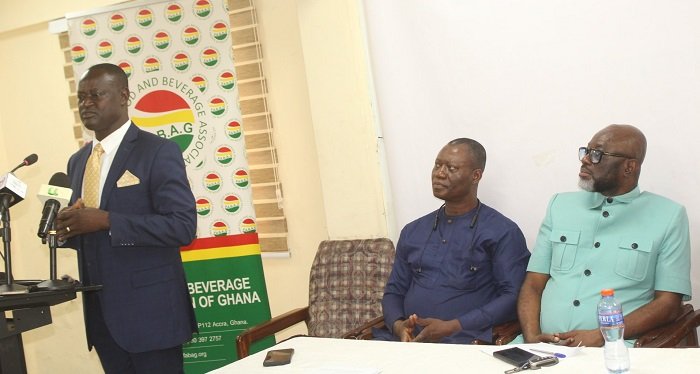FABAG Calls for Urgent Reduction in Utility Costs

The Food and Beverage Association of Ghana (FABAG) has appealed to the government to urgently address the rising cost of utilities, warning that failure to act could compel several local industries to relocate to neighbouring countries.
According to the Association, utility tariffs have become unbearably high, while the Electricity Company of Ghana (ECG) and Ghana Water Limited (GWL) continue to petition the Public Utilities Regulatory Commission (PURC) for further increases despite persistent inefficiencies.
At a press conference in Accra yesterday, the Chairman of FABAG, Reverend John Awuni, called on President John Dramani Mahama to initiate comprehensive reforms at ECG and GWL before any new tariff adjustments are approved.
He said the cost of electricity and water had reached unsustainable levels for businesses and households, describing the situation as a “profound injustice” that forces Ghanaians to “subsidise corruption, waste and managerial incompetence.”
Citing the 2024 Auditor-General’s Report, Rev. Awuni noted that ECG lost 32 per cent of all electricity purchased in 2024, compared to PURC’s benchmark of 21 per cent. He also alleged that inefficiencies and corruption were widespread within the company, with some staff owning private firms that benefited from inflated internal contracts.
“In just two months, billing failures caused ECG to lose GH¢893 million, while in 2023 the company collected GH¢11.5 billion but declared only GH¢8.6 billion,” he claimed, stressing that businesses could no longer bear the burden of inefficiency.
FABAG therefore urged government to launch an Executive Reform Agenda (ERA) anchored on measurable Key Performance Indicators (KPIs) and enforced by a Presidential Task Force (PTF) to ensure accountability and efficiency within ECG and GWL.
The Association further proposed a Performance Compact between the Ministry of Finance, PURC, Energy Commission and ECG — signed under the President’s authority — to guarantee that reforms are implemented and monitored.
Rev. Awuni cautioned that without affordable and reliable utilities, government’s 24-hour economy initiative and industrialisation drive would suffer setbacks. He cited Uganda, Kenya and India as examples where reforms transformed the power sector, noting that Uganda reduced power losses from 38 per cent in 2005 to 16 per cent by 2016.
“Efficiency before tariffs — that is the reform Ghana needs,” he emphasised.
BY CECILIA YADA LAGBA & CHELSEALINA ASANTE
🔗 Follow Ghanaian Times WhatsApp Channel today. https://whatsapp.com/channel/0029VbAjG7g3gvWajUAEX12Q
🌍 Trusted News. Real Stories. Anytime, Anywhere.
✅ Join our WhatsApp Channel now! https://whatsapp.com/channel/0029VbAjG7g3gvWajUAEX12Q






